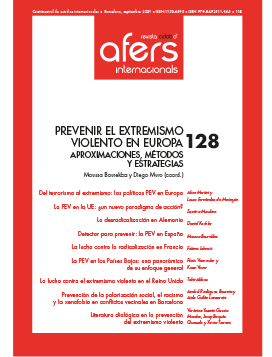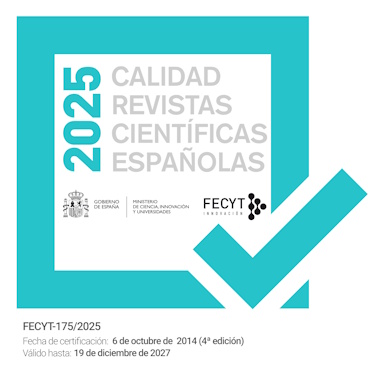Deradicalisation in Germany: preventing and countering violent extremism
Keywords:
Germany, preventing violent extremism (PVE), countering violent extremism (CVE), deradicalisation, diversity of programmes, fight against radicalisation, terrorismAbstract
Revista CIDOB d’Afers Internacionals, n. 128
Quadrimestral (May-September 2021)
ISSN:1133-6595 - E-ISSN:2013-035X
DOI: doi.org/10.24241/rcai.2021.128.2.59/en
This article examines the development of German policies aiming at the deradicalisation of extremists and terrorists which, originating in the late 1980s, were initially focused on left-wing terrorists. In the 1990s, the German authorities extended their funding to civil society initiatives which, in the 2000s, has led to the widespread adoption of deradicalisation initiatives. From 2012 onwards, Germany also started to implement far-reaching programmes which, focused on the social setting of jihadist extremists, have eventually come to constitute one of the world’s most diverse set of projects for preventing and countering violent extremism (P/CVE). While analysing the basic features of the German P/CVE, the article discusses essential lessons for other countries. The most salient German experiences are the diversity of the actors involved, the variety of sources of funding, and global standards of quality.
References
Ashour, Omar. «Online De-Radicalization? Countering Violent Extremist Narratives: Message, Messenger and Media Strategy». Perspectives on Terrorism, vol. 4, n.° 6 (2011), p. 15-19.
Baaken, Till; Korn, Judy; Ruf, Maximilian y Walkenhorst, Dennis. «Dissecting Deradicalization: Challenges for Theory and Practice in Germany». International Journal of Conflict and Violence, vol. 14, n.° 2 (2020), p. 1-18.
Bjørgo, Tore; van Donselaar, Jaap y Grunenberg, Sara. «Exit from right-wing extremist groups. Lessons from disengagement programs in Norway, Sweden and Germany». En: Bjørgo, Tore y Horgan, John (eds.). Leaving Terrorism Behind. Individual and collective disengagement. Nueva York: Routledge, 2009, p. 135-151.
Bob, Yonah J. «German counter-terror expert: No such thing as 'inevitable' terrorism». The Jerusalem Post, (3 de septiembre de 2018) (en lìnea) https://www.jpost.com/israel-news/i-do-not-believe-in-inevitable-terrorism-says-german-counter-terror-expert-566376
Bohn, Irina; Kreft, Dieter; Stüwe, Gerd y Weigel, Georg. «Das Aktionsprogramm gegen Aggression und Gewalt», en: Otto, Hans-Uwe y Merten, Roland (eds.). Rechtsradikale Gewalt im vereinigten Deutschland. Jugend im gesellschaftlichen Umbruch. Opladen: Leske + Budrich, 1993, p. 301-309.
Braddock, Kurt y Horgan, John. «Towards a guide for constructing and disseminating counter-narratives to reduce support for terrorism». Studies in Conflict & Terrorism, vol. 39, n.° 5 (2015), p. 381-404.
Briggs, Rachel y Feve, Sebastien. Review of Programs to Counter Narratives of Violent Extremism. Londres: Institute for Strategic Dialogue, 2013.
Bundesregierung. Strategie der Bundesregierung zur Extremismusprävention und Demokratieförderung. Berlín: Bundesministerium des Innern, 2016 (en línea) https://www.bmfsfj.de/resource/blob/109002/5278d578ff8c59a19d4bef9fe4c034d8/strategie-der-bundesregierung-zur-extremismuspraevention-und-demokratiefoerderung-data.pdf
Bundesregierung. Antwort der Bundesregierung auf die Kleine Anfrage der Abgeordneten Benjamin Strasser, Stephan Thomae, Grigorios Aggelidis, weiterer Abgeordneter und der Fraktion der FDP - Drucksache 19/22753 -. Bundestag, Drucksache 19/23540, (21 de octubre de 2020a) (en línea) https://dserver.bundestag.de/btd/19/235/1923540.pdf
Bundesregierung. Maßnahmenkatalog des Kabinettausschusses zur Bekämpfung von Rechtsextremismus und Rassismus. Presse- und Informationsamt der Bundesregierung, (25 de noviembre de 2020b) (en línea) https://www.bundesregierung.de/resource/blob/997532/1819984/4f1f9683cf3faddf90e27f09c692abed/2020-11-25-massnahmen-rechtsextremi-data.pdf
Caplan, Gerald. Principles of preventive psychiatry. Nueva York: Basic Books, 1964.
Fiebig, Verena y Köhler, Daniel. «Radikalisierungsprävention und Deradikalisierung. Qualifizierung von Fachpersonal als sicherheitspolitische Aufgabe». Kriminalistik, n.° 8/9 (2018), p. 519-525.
Fiebig, Verena y Koehler, Daniel. «Knowing What to Do: Academic and Practitioner Understanding of How to Counter Violent Radicalization». Perspectives on Terrorism, vol. 13, n.° 3 (2019), p. 44-62.
Glaser, Michaela; Hohnstein, Sally y Greuel, Frank. «Ausstiegshilfen in Deutschland. Ein vergleichender Überblick über Akteure und Vorgehensweisen», en: Rieker, Peter. (ed.) Hilfe zum Ausstieg? Ansätze und Erfahrungen professioneller Angebote zum Ausstieg aus rechtsextremen Szenen. Weinheim: Beltz Juventa, 2014, p. 45-76.
Harris-Hogan, Shandon; Barrelle, Kate y Zammit, Andrew. «What is countering violent extremism? Exploring CVE policy and practice in Australia». Behavioral Sciences of Terrorism and Political Aggression, vol. 8, n.° 1 (2015), p. 6-24.
Heydemann, Steven. «Countering violent extremism as a field of practice». Insights - United States Institute of Peace, n.° 1 (2014), p. 1, 9-11.
Horgan, John y Braddock, Kurt. «Rehabilitating the Terrorists? Challenges in Assessing the Effectiveness of De-radicalization Programs». Terrorism and Political Violence, vol. 22, n.° 2 (2010), p. 267-291.
IMK-Innenministerkonferenz. «Abschlussbericht der Arbeitsgruppe des AK IV unter Beteiligung des AK II zur Bekämpfung des gewaltbereiten islamistischen Extremismus – Erfolgsfaktoren für Aussteigerprogramme „Gewaltbereite Islamisten“». IMK, (10 de octubre de 2016) (en línea) https://www.innenministerkonferenz.de/IMK/DE/termine/to-beschluesse/2016-11-29_30/nummer%204%20abschlussbericht%20aussteigerprogramme.pdf?__blob=publicationFile&v=4
Kober, Marcus. «Zur Evaluation von Maßnahmen der Prävention von religiöser Radikalisierung in Deutschland». Journal for Deradicalization, n.° 11 (2017), p. 219-257.
Lützinger, Saskia; Gruber, Florian y Hedayat, Ali. «Extremismuspräventionslandschaft - eine Bestandsaufnahme präventiver Angebote in Deutschland sowie ausgewählter Präventionsstrategien aus dem europäischen Ausland», en: Ben Slama, Brahim y Kemmesis, Uwe (eds.). Handbuch Extremismusprävention. Gesamtgesellschaftlich, Phänomenübergreifend. Wiesbaden: Bundeskriminalamt (BKA), 2020, p. 597-626.
Lützinger, Saskia; Gruber, Florian y Kemmesis, Uwe. Extremismusprävention in Deutschland - Erhebung und Darstellung der Präventionslandschaft. Wiesbaden: Bundeskriminalamt (BKA), 2016.
ORF-Österreichischer Rundfunk. «Deradikalisierungsprogramm im Fokus». Österreichischer Rundfunk, (4 de noviembre de 2020) (en línea) https://wien.orf.at/stories/3074346/
Ostwaldt, Jens. «Closing the “Critical Disconnect“. The establishment of regional prevention networks at the interface of prevention and deradicalisation work using the example of the Federal State Democracy Centre Baden-Wuerttemberg». Journal for Deradicalization, n.° 14 (2018), p. 218-248.
RAN-Radicalisation Awareness Network. «RAN Handbook on CVE/PVE training programmes. Guidance for trainers and policy-makers». RAN, (diciembre de 2017) (en línea) https://ec.europa.eu/home-affairs/sites/default/files/what-we-do/networks/radicalisation_awareness_network/ran-papers/docs/ran_handbook_on_cve_pve_training_programmes_12-2017_en.pdf
Reinares, Fernando; Alonso, Rogelio; Bjørgo, Tore; Della Porta, Donatella; Coolsaet, Rik; Khosrokhavar, Farhad; Lohlker, Rüdiger; Ranstorp, Magnus; Schmid, Alex; Silke, Andrew; Taarnby, Michael y de Vries, Gijs. «Radicalisation Processes Leading to Acts of Terrorism. A concise Report prepared by the European Commission's Expert Group on Violent Radicalisation». European Commission, (15 de mayo de 2008) (en línea) https://www.clingendael.org/sites/default/files/pdfs/20080500_cscp_report_vries.pdf
Reinhard, Doreen. «Er war vollkommen ruhig und gelassen». Die Zeit, (20 de octubre de 2020) (en línea) https://www.zeit.de/gesellschaft/zeitgeschehen/2020-10/messerangriff-dresden-tatverdaechtiger-islamismus-extremismus-praevention?utm_referrer=https%3A%2F%2Fwww.google.com%2F
Renard, Thomas. «Overblown: Exploring the Gap Between the Fear of Terrorist Recidivism and the Evidence». CTC Sentinel, vol. 13, n.° 4 (2020), p. 19-29.
Said, Behnam y Fouad, Hazim. Countering Islamist Radicalisation in Germany: A Guide to Germany’s Growing Prevention Infrastructure. La Haya: International Centre for Counter-Terrorism, 2018.
Seils, Christof. «Auf rechtsextreme Täter nur bedingt übertragbar». Berliner Zeitung, (8 de diciembre de 2000)
Shaw, Danny. «London Bridge: Usman Khan completed untested rehabilitation scheme». BBC, (4 de diciembre de 2019) (en línea) https://www.bbc.com/news/uk-50653191
Walsh, Maria y Gansewig, Antje. «A former right-wing extremist in school-based prevention work: Research findings from Germany». Journal for Deradicalization, n.° 21 (2019), p. 1-42.
Williams, Michael J. «Prosocial behavior following immortality priming: experimental tests of factors with implications for CVE interventions». Behavioral Sciences of Terrorism and Political Aggression, vol. 9, n.° 3 (2017), p. 153-190.













